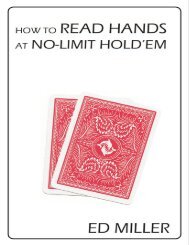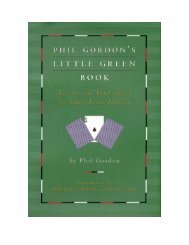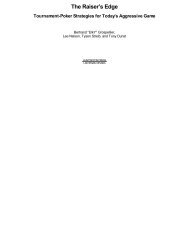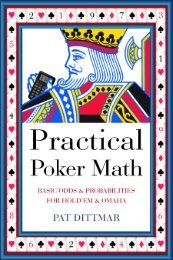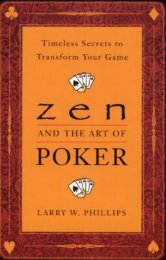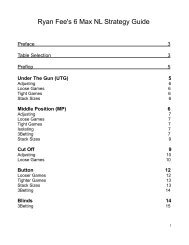Create successful ePaper yourself
Turn your PDF publications into a flip-book with our unique Google optimized e-Paper software.
At the Table<br />
A Bit of Memory<br />
117<br />
Up to this point, I've used very few methods that require any<br />
memory. However, there are a few situations that come up very<br />
frequently where it will benefit you to commit a few things to<br />
memory. Mostly this consists of preflop scenarios and hands<br />
that clash on a given flop. Memorizing these situations will just<br />
save you energy when playing in real time.<br />
Table 9 shows situations that are good to memorize when<br />
estimating your equity preflop. This is useful information if<br />
you're going to be getting all-in preflop. Note the unpaired<br />
hands in the examples are all offsuit holdings. When you hold a<br />
suited hand instead of an offsuit hand, you're preflop equity<br />
generally increases by about 4%.<br />
Table 9. All-in preflop equity for hand groups.<br />
Situation Example Equities<br />
Overcard vs. 2 middle cards A8o vs. QJo 57% vs. 43%<br />
Overcard vs. 1 middle card ATo vs. Q7o 65% vs. 35%<br />
2 overcards vs. 2 under cards 55 vs. AKo 55% vs. 45%<br />
Pair vs. 1 overcard 88 vs. A2o 70% vs. 30%<br />
Pair vs. 2 undercards KK vs. 87o 82% vs. 18%<br />
Pair vs. 1 undercard AA vs. AKo 93% vs. 7%<br />
Overpair vs. underpair AA vs. 55 81% vs. 19%<br />
Another good thing to commit to memory is strong preflop hands<br />
compared to strong preflop ranges. Again, this is useful when<br />
you're going to be getting all-in preflop. Many times after<br />
you've reraised with a hand like JJ, someone will shove over<br />
you. You need to think about their range to estimate your equity



